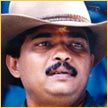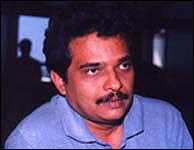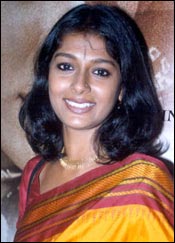
|
'It is no crime for a director to want commercial success'
Director Jayaraj retells a Shakespearean tale into cinematic gold
|
Prem Panicker
It is a village --- any village --- located on Kerala's border with Tamil Nadu.
On the day the tale of director Jayaraj's Kannagi opens, the villagers are clustered around an open space, their raucous voices egging on two fighting cocks as they battle to the death. The respective owners have five thousand rupees riding on the outcome. At the sidelines, bets are being made, and accepted, at furious pace.
The sport is, for the village, more than two cocks fighting till one is dead. It is entertainment, main revenue earner and, above all, a way of proving its supremacy over neighbouring villages: my cock is tougher than yours.
At the centre of this conflict are Choman (Siddique), a typical villager with an entourage but no visible means of earning, whose main occupation is rearing fighting cocks to take on all comers. His rival is the headman, the Gounder (Manoj K Jayan) , of a neighbouring village.
The protagonist is trainer extraordinaire Manickam (director-turned-character actor Lal), who ensures Choman's victory in the story-opening fight.
The village's mystery inhabitant is Kannagi (Nandita Das) who, according to the buzz, is a Visha Kanyaka (the famed Poisoned/Poisonous Virgin of myth and legend), living in isolation in a cottage decked out with the arcane of Hinduism's more esoteric deities.
The village --- specifically, Gounder and Choman --- lust after her but dare not touch, thanks to the stories circulating about her magical powers.
Kannagi and Manickam develop a liaison that intensifies into a very close relationship. Possessed of a man she can admire, Kannagi turns possessive to the point where she would rather her paramour lost his next cockfight if that meant he would be hers forever.
To round off the emotional triangle, Choman's sister Kumudam (Geetu Mohandas) also admires Manickam.
The various relationships interplay in a tale of lust and love, treachery and double-dealing that climaxes in the gory suicide of Manickam, and the horrifying one of a remorseful Kannagi.
On the surface, it is a simple (and very low-budget) tale, skillfully told. The script is taut, events move along with the inevitability of Greek drama. The acting is inch perfect, from Jayan's arrogant landlord to Choman's idiosyncratic villager to Manickam's to-the-manner-born trainer of cocks to Kannagi's doomed siren.
Kaithapuram's music, especially the background score, complements M J Radhakrishnan's cinematography, frenetic when capturing the cockfights that are the set pieces of the film, lyrical when stepping back to take in the mountainous backdrop.
Above all, however, this is a director's film, and Jayaraj has the assurance of a veteran as he melds story and performance into an entrancing whole. From tight script to meticulously paced narration, the skill shows.
More so when you realise --- and realisation dawns well after you have seen the movie, when you put aside the initial emotions and try to break down the film into its composite parts --- that in an age where filmmakers throw millions into an effort to make their films visually appealing, Jayaraj has made an entire film with probably just the one set that, from various angles, doubles as Nandita's house and that of Choman, while the rest of it is just your ordinary, plain vanilla Kerala outdoors.
This is alchemy, a budget of pennies, being turned into cinematic gold.
That much is on the surface. Step back, however. Forget the actual characters and backdrops and look at the bare bones of the tale and you find yourself thinking, ah, Antony And Cleopatra. Not, mind you, because you read about it.
In fact, when I sat down to see the film, I was under the impression that this was a remake of Macbeth. During the initial parts, I kept trying to relate the events to the tale of Macbeth, and failed.
But then, as the relationship between the protagonists intensified, as the pulls and pressures created tension onscreen, came the moment when it all clicked into place and I found myself saying out loud, 'Shit, this is Shakespeare's Antony And Cleopatra.'
It is tempting to recall scenes, if only to depict the translation of an epic tale set against the backdrop of Egypt and Rome to a little village in Kerala. But to do that would be to play spoiler. Spot the similarities yourself, it is far more fun.
So effective is the recreation (make that two out of two for Jayaraj, who had earlier reworked the story of Othello into Kaliyattam, the National Award winner starring Suresh Gopi in the title role and Manju Warrier as Desdemona), that I was tempted to call the director and get his take. Excerpts:
 For some reason Kannagi made me think of Akira Kurosawa's Throne Of Blood.
For some reason Kannagi made me think of Akira Kurosawa's Throne Of Blood.
That is not surprising. There is no denying that Kurosawa is my original inspiration. I have always been fascinated by his films, especially by his ability to translate stories into his particular milieu, as he did with the story of Macbeth in Throne Of Blood.
In fact, that film ran alongside my previous one on Othello, at the Birmingham Film Festival last year when they had a special section on films with Shakespeare-derived stories.
Why, in an age when the school curriculum in England is moving away from the Bard, would you want to dig him up? That too twice? Where lies his relevance?
To me, the most important thing about a Shakespeare play is the audience he wrote it for.
If you think back to his time, you realise that when his play was staged, it was for an audience that comprised nobles and commoners, the rich and the poor, at one and the same time.
He had to write in such a way that he could capture the attention of all classes. Isn't that what movies try to do today, mostly without success? He was a master at bringing the entire audience under his spell.
Granting that, are the stories he told relevant today? Antony And Cleopatra, for instance, was about love and lust against the backdrop of empires, of larger-than-life warriors who led armies into battle.
No, all that --- armies, heroes --- those are merely the background. The story is about love, lust, treachery, betrayal. All emotions as basic as human nature, and perennially relevant.
How, in your imagination, did the all-conquering Mark Antony become the trainer of fighting cocks? How did the gorgeous Cleopatra become a village witch?
When retelling a story, you have to understand the essence of the characters you are handling. From that point of view, who or what is Antony? He is a general who strategises, who trains his army to fight his way, who takes them to battle and leads them to victory.
So who is my character Manickam? He is a general who trains his fighting cock in strategy and tactics, who takes it to battle, leads it throughout, and makes it win. The essence of the character remains the same. I merely change the backdrop.
Look at Cleopatra. When you strip away the hype, just who or what is she? She is a beautiful woman on her own, the kind men want to possess, to own. But around her, there is this aura of mystery that acts like a shield, and does not permit the average man from reaching out to touch, to possess.
Where did this aura of mystery come from? Did Cleopatra create it herself, did she construct her own shield?

Look at my heroine, Kannagi. She is a beautiful girl, living alone in a village. In the normal course, she would have been prey to any and all men. But then there is the mystery that surrounds her, the belief that her touch is poisonous, fatal.
So while the men in the village lust for her, they dare not try and translate their dreams into action.
So the scene where Kannagi cures a young boy bitten by a snake is your way of underlining your reading of Cleopatra's character, a nudge and a wink for the audience?
It is a bit of both. As far as the outside world is concerned, the incident reinforces the myth. A boy is bitten by a snake, the mother takes her to the Visha Kanyaka and he is cured.
But we, the audience, see what actually transpires. She uses not magic, but medicine, to affect her cure, while allowing the ill-informed myth to feed on itself and grow even larger and, therefore, more of a shield.
Contemporary filmmakers have been hunting for ways to fill theatres, to speak in an idiom that works in the city and the village, that speaks to the front-bencher and the guy who buys his ticket at 100 bucks a pop. You argue that Shakespeare knew the secret of mass appeal. You have now translated two of his plays into successful movies. So has the well run dry or will you go back to the Bard for further inspiration?
I would think that any story of Shakespeare can be recreated: the comedies, the tragedies, even the fantasies. Specifically, I have been thinking of taking up Julius Caesar next.
Is that your current project, translating Caesar's Rome into a Keralite village?
No, right now I am working on Thilakkam, with Dileep in the lead opposite Kavya Madhavan. It is based on a real incident, but it is an out and out commercial film.
Caesar is for later. Again, it is a story of basic, powerful human emotions --- power, jealousy, treachery --- against the backdrop of war and conquest. I thought it would be interesting to tell the tale against the backdrop of our ancient martial arts form, Kalarippayattu.
You say you are now working on an out and out commercial venture. You seem to do this all the time, produce a visual art one minute, then come up with commercial kitsch the next. Is it that you cannot make up your mind what kind of director you want to be, which voice --- artistic or commercial --- you want to speak in?
Actually, it is because I don't believe in this division between the two, I don't believe that art and commerce are mutually exclusive, or that it is some kind of crime for a director to actually want his film to be a commercial success.
The real problem, I think, is that 'art cinema' is a much abused term. In its time, (Satyajit) Ray's Pather Panchali was art cinema. But over time, it became a swamp engulfing our filmmakers. That became the standard to which we are still stuck.
Even today we believe that 'art cinema' is about slowing down the pace, creating a lag between one scene and the next, using static camera positions and the like.
But if we look at the best of world cinema, we see that much has changed, in both subject and narrative technique. World cinema has moved on, it has changed. We are not changing with it.
Take Kurosawa, for instance. By any definition, his films, whether you talk of a Rashomon or a Ran or Throne Of Blood or Seven Samurai, are high art. Yet, they have mass appeal, they enjoyed commercial success. Which brings me back to what I said. Art and commerce are not mutually exclusive.
I don't understand, frankly, why people use such shocked, disbelieving tones when they ask me, "What, you are making a commercial film?!"